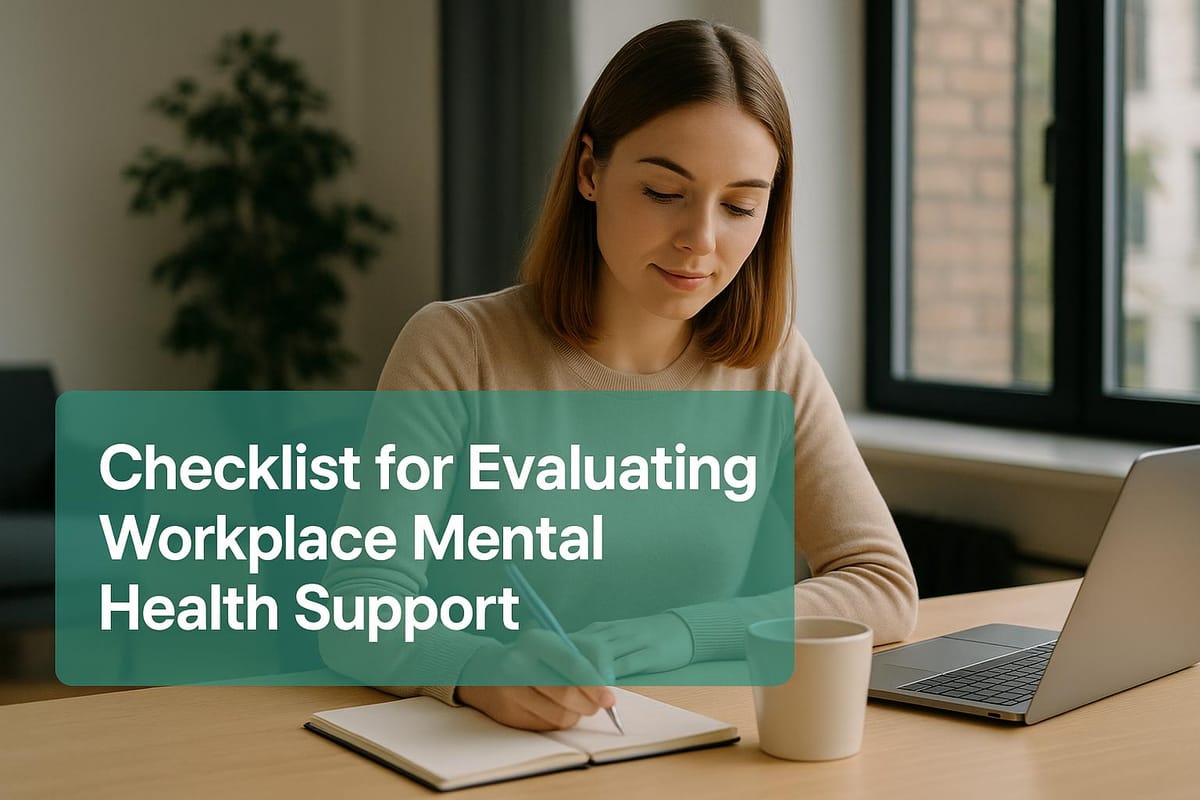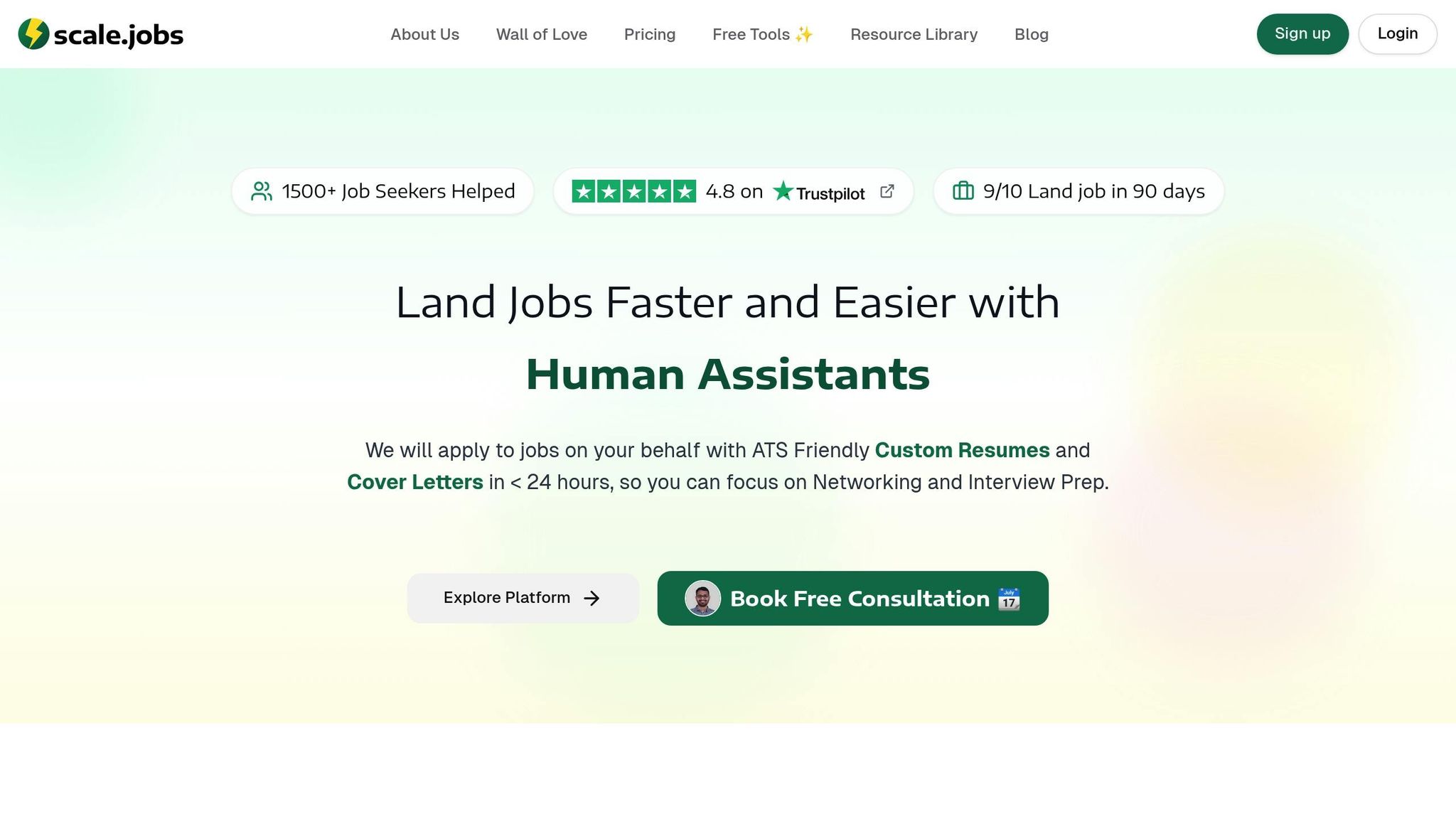Checklist for Evaluating Workplace Mental Health Support
Learn how to evaluate workplace mental health support during your job search to ensure a nurturing and productive environment.

Workplace mental health support is a key factor in employee well-being and productivity. Companies that prioritize mental health see lower turnover, higher engagement, and improved job satisfaction. If you're evaluating potential employers, here’s what to look for:
- Employee Benefits: Does the company offer counseling, mental health programs, or flexible time-off policies?
- Workplace Culture: Are leaders and managers trained to support mental health? Are there safe spaces for open conversations?
- Resources Accessibility: Are services like therapy, mindfulness programs, or stress management tools easy to access?
- Transparency: Does the company seek feedback and update policies to meet employee needs?
How to assess these factors:
- Research company websites, social media, and employee reviews (e.g., on Glassdoor).
- Ask direct questions during interviews about mental health benefits and initiatives.
- Network with current or former employees to understand the actual workplace environment.
Tools like scale.jobs can simplify the process, offering features like job tracking, tailored employer research, and real-time assistance to help you find companies that genuinely support mental health. By focusing on these areas, you can make informed decisions and choose a workplace where you can thrive.
Does your workplace support your mental health and wellbeing?
Mental Health Support Checklist for Job Seekers
Here's a helpful checklist to gauge how well potential employers prioritize mental health. Each section highlights important aspects to consider as you navigate your job search.
Employee Benefits and Company Policies
Start by looking into the company's policies. Do they provide access to counseling services, structured mental health programs, or generous time-off policies aimed at promoting well-being? Beyond what's written, consider how these policies play out in the workplace. Are they genuinely part of the company's day-to-day culture?
Company Culture and Environment
Take a closer look at the workplace culture. Are leadership teams visibly committed to mental health? Do managers receive training to support their teams effectively? Check whether the company offers support groups, safe spaces for open conversations, or other tools that encourage employees to speak freely about their well-being.
Access to Mental Health Resources
What kind of mental health resources are available? Look for services like counseling, mindfulness programs, or stress management initiatives. Accessibility is key - make sure these resources are easy for employees to use when needed.
Company Transparency and Progress Tracking
Transparency matters. Does the company actively seek employee feedback on mental health initiatives? Are they open about their efforts and regularly updating their policies to reflect current needs? A commitment to clear communication and continuous improvement speaks volumes about their priorities.
How to Use This Checklist During Your Job Search
Using this checklist during your job search can help you evaluate a company's commitment to mental health support. It involves a mix of online research, thoughtful interview questions, and networking to gather meaningful insights.
Research Company Information Online
Start by exploring the company's website. Check for sections that detail employee benefits, wellness programs, or company values related to mental health. Many organizations highlight their Employee Assistance Programs (EAPs) or other mental health benefits on their careers pages.
Browse the company’s social media channels for posts about wellness initiatives, mental health awareness campaigns, or testimonials from employees. Look for tangible evidence that supports their claims about mental health resources.
Dig deeper by researching the leadership team. Public statements from a CEO or other executives about mental wellness can reflect a supportive culture that trickles down through the organization.
Platforms like Glassdoor can provide valuable insights from employees. Pay attention to reviews that mention stress levels, work-life balance, management support, and access to mental health resources. Look for consistent patterns in the feedback.
"I think it's important when you're looking at the job posting to look for certain language that can tell you what the expectations of the position will be. So for example, some will say 'We need somebody who can deal with a fast-paced environment,' which is typically coded language for high stress and potentially high burnout… Is there language that can clue you in that perhaps work-life balance is off or that the expectations may be for you to work outside of traditional business hours?" - Nidhi Tewari, therapist and mental health keynote speaker
This research lays the groundwork for the next step: asking the right questions during interviews.
Questions to Ask During Job Interviews
The interview is your chance to confirm what you've learned and dig deeper into the company’s mental health support. Use this time to ask direct and specific questions that go beyond surface-level information.
For example, inquire about available programs: "Does the company offer an Employee Assistance Program?" or "What mental health resources are included in the benefits package, such as counseling or therapy?"
Ask about wellness initiatives: "Are there any wellness programs such as stress management workshops, mindfulness training, or fitness incentives?" and "Does the company provide mental health education or training for employees?"
It’s also important to understand accessibility: "Are mental health professionals or mental health apps available to employees, and how easy are they to access?"
Pay close attention to how the interviewer responds. A positive, open reaction often signals genuine support, while hesitation or dismissive answers may suggest that mental health isn’t a priority.
Network with Current and Former Employees
Networking can give you firsthand insights into how mental health is handled within the company. Current and former employees can provide candid feedback about their experiences.
Reach out on LinkedIn to employees working in roles or departments similar to the one you're considering. Ask about their experiences with management support for mental health, whether the resources are actually used, and the overall workplace culture around mental health days or time off.
Former employees can be especially revealing. They can share whether the company's mental health policies are actively practiced or simply exist on paper.
For a well-rounded perspective, connect with employees at various levels of the company hierarchy. If you have connections in your professional network who know someone at the company, leverage those relationships for more honest and open conversations about the organization's approach to mental health support.
Job Search Tools for Comparing Employers
Modern job search platforms have made it easier than ever to evaluate employers, including their commitment to mental health support. These tools simplify your research and provide valuable insights into company culture and benefits.
How scale.jobs Helps Compare Employers

Scale.jobs combines advanced software, AI, and human expertise to help you assess a company's mental health support. Here's how its features can make your evaluation process more effective:
- Job Applications Tracker: Compare companies side-by-side, focusing on mental health benefits, policies, and workplace culture.
- Salary Predictor: Go beyond base pay by factoring in the value of benefits like therapy coverage, Employee Assistance Programs, and wellness stipends.
- Interview Questions Predictor: Get tailored suggestions for asking about a company's mental health initiatives during interviews.
- Human Assistant Service: Trained virtual assistants and reverse recruiters provide in-depth research into company policies and culture, complete with real-time WhatsApp updates and time-stamped proof of their work.
- Flat-Fee Model: Avoid recurring fees and focus your resources on connecting with companies that prioritize mental health.
These features set the stage for a direct comparison with other job search platforms.
scale.jobs vs Other Job Search Platforms
When compared to competitors like Jobscan and TealHQ, scale.jobs offers distinct advantages that make it a standout choice.
Against Jobscan
- Limited Scope: Jobscan focuses mainly on resume optimization and ATS compatibility, offering limited tools to assess mental health benefits.
- Research Gaps: It doesn't provide the in-depth research needed to evaluate company policies on mental health.
- Comprehensive Approach: Scale.jobs not only creates ATS-friendly resumes but also delivers personalized employer analyses, giving you a broader perspective.
Against TealHQ
- Surface-Level Insights: TealHQ offers job tracking and general company insights, but its data largely comes from public sources, offering limited depth on mental health benefits.
- Detailed Analysis: Scale.jobs combines automated tools with human-driven research to uncover deeper insights about mental health support, workplace culture, and employee satisfaction.
- Customized Assistance: With human assistants tailoring applications and documenting findings transparently, scale.jobs ensures your applications reflect your priorities around wellness and mental health.
This unique approach empowers you to make informed decisions about which companies genuinely value mental health in the workplace.
Making Smart Decisions About Your Mental Health at Work
Your mental health should always take precedence. Struggling with mental health can negatively impact your productivity, overall well-being, and job satisfaction, which is why it's important to seek out employers who genuinely value mental wellness as a key part of their workplace culture.
A structured approach can simplify what might feel like a daunting task. By focusing on the "four A's" - Awareness, Accommodations, Assistance, and Access - you can evaluate potential employers more effectively. This method helps you look beyond surface-level wellness programs to identify companies that truly prioritize mental health. Employers with strong mental health initiatives often enjoy better employee retention, higher engagement, and a more satisfied workforce.
Even during the job search, your mental health shouldn't take a backseat. Scale.jobs makes it easier to focus on what matters most by offering tools designed to streamline your evaluation process. Features like the Job Applications Tracker allow you to compare mental health benefits across employers, while real-time WhatsApp updates from human assistants provide transparent insights. These tools free up your time, so you can concentrate on networking and preparing for interviews, making your decision-making process smoother and more focused.
Using this checklist as a guide can set you up for long-term success. When you choose employers who prioritize mental wellness through leadership support, comprehensive Employee Assistance Programs, and open discussions about mental health, you're not just finding a job - you’re creating a foundation for professional growth and personal well-being. By leveraging tools that help you assess genuine support, you’re ensuring that your workplace is a space where you can truly thrive.
FAQs
How can I assess a company's mental health support during the interview process?
When interviewing with a company, it’s important to get a sense of how they support mental health. Ask specific questions about their policies and programs, like whether they offer mental health benefits, employee assistance programs, or initiatives that encourage work-life balance. Pay close attention to how openly the interviewer responds - this can give you insight into the company’s culture.
You’ll also want to look for tangible signs of a supportive environment. Do they mention mental health resources? Flexible work arrangements? Leadership’s dedication to employee well-being? Beyond the interview, take some time to read reviews or testimonials from current and former employees. This can help you understand how the company approaches mental health in practice. By doing your homework, you’ll get a clearer picture of whether the company truly values mental wellness.
What are the warning signs of poor mental health support in a workplace?
Signs a Company May Lack Mental Health Support
When assessing how a company prioritizes mental health, there are key red flags to keep in mind. These can reveal whether support for employees' well-being is truly a priority or just an afterthought. Here are a few things to look out for:
- Burnout among employees: Noticeable patterns of chronic fatigue, mood swings, or social withdrawal can signal that workers are overwhelmed and unsupported.
- Stressful work culture: A workplace that accepts excessive stress, poor work-life balance, or imposes unrealistic deadlines can harm mental well-being.
- Inadequate mental health policies: A lack of access to counseling services, wellness programs, or flexible work options often points to insufficient attention to employees' mental health needs.
Also, consider how openly mental health is discussed within the company. Does leadership actively encourage conversations and foster a supportive atmosphere? These factors can reveal whether their efforts are genuine or just surface-level.
How does scale.jobs help job seekers find companies that prioritize mental health support?
How Scale.jobs Supports Job Seekers
Scale.jobs bridges the gap between job seekers and employers who prioritize mental health, combining personalized human support with intelligent tools. From creating ATS-friendly resumes to crafting tailored cover letters, every aspect of your job application is designed to showcase your compatibility with companies that value mental well-being. Plus, with real-time WhatsApp support, you're never left navigating the process alone.
What sets Scale.jobs apart is its unique approach. Instead of relying solely on automated software, it takes the pressure off by assigning trained human assistants to handle time-consuming tasks. With a simple one-time payment model and proof-of-work transparency, you get a stress-free experience and the confidence that you're connecting with workplaces that genuinely care about their employees.




